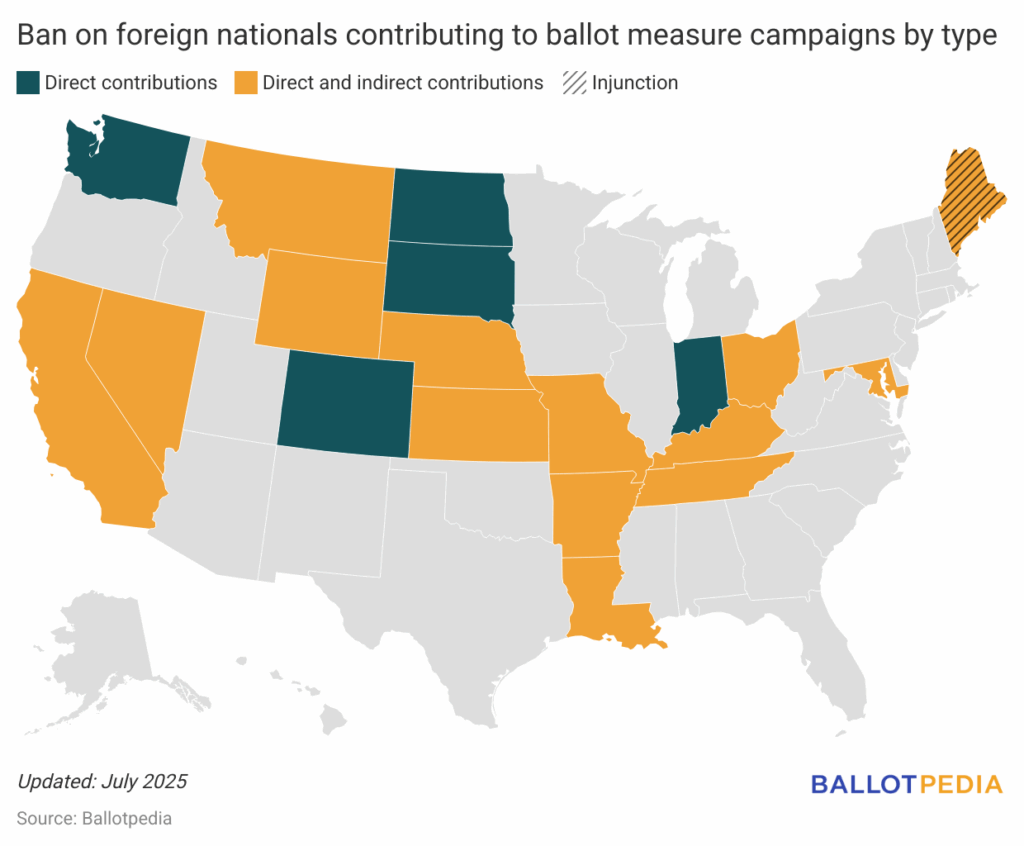In Maine, a federal appellate court upheld a district court’s injunction blocking enforcement of Question 2, which prohibited foreign governments and certain entities from contributing to ballot measure elections. Voters passed Question 2 in 2023 by a margin of 86% to 14%.
The First Circuit Court of Appeals ruled that Question 2 would be unconstitutional by limiting the free speech of U.S. corporations with foreign shareholders. Justice Lara Montecalvo wrote, “The prohibition is overly broad, silencing U.S. corporations based on the mere possibility that foreign shareholders might try to influence its decisions on political speech, even where those foreign shareholders may be passive owners that exercise no influence or control over the corporation’s political spending.”
Question 2 prohibited foreign governments and entities with at least 5% foreign government ownership or control from spending money to influence ballot measures or candidate elections.
Central Maine Power and Versant—corporations providing utilities in Maine—challenged Question 2 on constitutional grounds. Central Maine Power and Versant were also top donors opposing Question 3 in that same election year, which was rejected by voters. Question 3 would have created a quasi-municipal electric utility and allowed it to purchase and acquire all investor-owned transmission and distribution utilities in Maine, including CMP and Versant. In 2021, Hydro-Québec and Avangrid, the parent company of CMP, funded the campaign against Question 1, which prohibited the construction of electric transmission lines defined as high-impact in the Upper Kennebec Region.
Judges Lara Montecalvo, Jeffrey Howard, and Seth Aframe further wrote, “CMP and Versant were founded in Maine, have operated exclusively there for over a century, and are entirely run by U.S. citizens… [evidence] does not demonstrate why the 5% threshold—as opposed to 100%, or 50%, or any other number—is narrowly tailored to its interests in preventing foreign influence in its elections. … In the face of these examples, the 5% threshold starts to look either like an end-run around Citizens United, aimed at silencing a large swath of corporations merely because they are corporations, or an effort to shape the ongoing debate in Maine about its two primary utility companies by silencing one side—the companies themselves.”
Sen. Rick Bennett (R), a proponent of Question 2, responded to the ruling, saying, “Mainers spoke with one voice: our elections should belong to us, not to corporations owned or influenced by foreign governments whose interests may not align with our own. It is outrageous that, once again, moneyed interests — foreign ones, no less — can continue to dominate our political discourse, drown out local voices, and distort public policy to serve their own agendas. The court’s decision means that entities entirely owned by foreign governments can still spend millions to sway our elections, while Maine voters struggle to be heard.”
Charles Miller, an attorney for the Institute of Free Speech, supported the ruling, saying, “The First Circuit sent a strong message that states cannot use trivial, remote, and vaguely defined ‘foreign influence’ over American corporations to make an end-run around Citizens United.”
The Citizens United v. Federal Election Commission decision, issued by the U.S. Supreme Court in 2010, held that the First Amendment prohibits the government from restricting independent expenditures for political communications by corporations, unions, and other organizations. The ruling struck down previous federal limits on such spending, determining that these limits constituted a restriction on free speech. The Citizens United ruling also impacted ballot measure campaigns by allowing corporations, unions, and other entities to spend unlimited funds independently to support or oppose initiatives.
The ruling on Question 2 wasn’t the only recent ruling in Maine. On July 15, a federal judge ruled that Question 1—a ballot measure that limited campaign contributions to super PACs, which voters approved in 2024—was unconstitutional. U.S. Magistrate Judge Karen Frink Wolf wrote, “The question in this case is whether the Supreme Court’s decision in Citizens United forecloses a state’s ability to limit contributions to political groups making independent expenditures. After Citizens United, there is no valid governmental interest sufficient to justify imposing limits on fundraising by independent-expenditure organizations.”
Ongoing litigation regarding foreign contributions to ballot measure campaigns is also occurring in two additional states: Kansas and Ohio. Across the country, at least 19 states have passed laws prohibiting foreign nationals or governments from contributing to ballot measure committees. Nine states in 2025 have made these changes, a record for the most states enacting such laws in a single year.

Additional:


